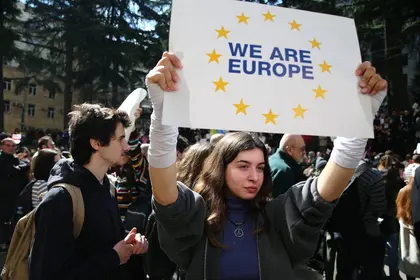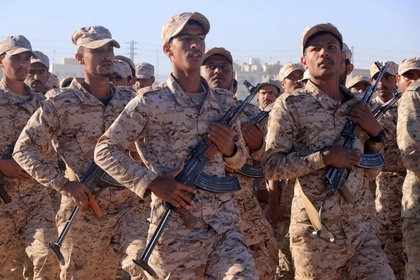Moscow on Friday accused foreign countries of fomenting mass protests in Georgia, likening them to an attempted coup designed to sow tension on Russia's borders.
JOIN US ON TELEGRAM
Follow our coverage of the war on the @Kyivpost_official.
Russian Foreign Minister Sergei Lavrov said that several days of demonstrations in the Georgian capital Tbilisi reminded him of a Ukrainian uprising that ousted a Kremlin-friendly government in 2014.
Hundreds of Georgians rallied for a fourth day outside parliament, keeping up their calls for a pro-European future, as lawmakers dropped the controversial "foreign agent" legislation that triggered violent clashes between police and protesters this week.
The demonstrations point to turmoil over the future of Georgia, which aims to join the EU and NATO, much to the frustration of Moscow.
Russia invaded Georgia in 2008 and recognised two separatist territories in the north of the country as independent, stationing military bases there after the war.
"There is no doubt that the law on the registration of non-governmental organisations was used as an excuse to start, generally speaking, an attempt to change the government by force," said Lavrov.
The protests looked similar to "Kyiv's Maidan" uprising, he said, and "are of course being orchestrated from abroad" with the aim of creating "an irritant on the borders of Russia".
Critics of the Georgian bill say it resembles Russian legislation used to silence dissenters.

Ukraine: Putin Confirms Attack with New Missile
Reacting to the claims of foreign influence, French President Emmanuel Macron said: "There is a tendency in the Kremlin, which is not new, to imagine that every public demonstration is a foreign manipulation because the fundamental belief is that there is neither public opinion nor free people."
- 'The only path' for Georgia -
The Kremlin also criticised remarks from Georgia's president, delivered from the United States, and accused Washington of stoking "anti-Russian" sentiment in the Black Sea state.
"We see where the president of Georgia is addressing her people from," said Kremlin spokesman Dmitry Peskov.
This week President Salome Zurabishvili sent messages of support to the protesters from New York, where she is on an official visit.
On Friday, she accused Russia of centuries of "attacking, occupying sovereign countries" in an interview with French news channel LCI, adding that "what is important" is the message of the Georgian protesters.
"We already have Russian troops at home... That did not prevent Georgia from staying independent and continuing on its path towards Europe," she said, adding that was "the only path that exists for a sovereign and independent Georgia".
Zurabishvili met US National Security Advisor Jake Sullivan on Friday, with a White House statement noting that both "welcomed the government's recent decision to withdraw" the draft legislation.
The pair also "discussed the need to ensure Russia continues to feel the full economic costs of the sanctions" levelled over its invasion of Ukraine, with Sullivan warning Georgia must "avoid becoming an avenue for evasion" of the economic restrictions.
- 'We want Europe' -
Georgian lawmakers had voted down the foreign agent bill in a second reading after just one MP out of 36 backed it.
Jailed ex-leader Mikheil Saakashvili praised the role that protesters had played in forcing the government to drop the bill.
"They were brilliantly resisting brutal force used against them," Saakashvili said in a Facebook post.
"No Russia with its brutal oligarch is in (a) position to defeat them," he said, referring to the billionaire founder of Georgia's ruling party, who has made his fortune in Russia.
Earlier Friday the mood was festive outside parliament, where throngs of Georgians blew whistles, waved their red and white flag and held signs reading: "We are Europe".
"We are happy that the law failed, that Georgian people prevailed and will continue to fight for their European future," said 20-year-old student Saba Meurmishvili.
He said he had attended the rally with his classmates from several universities to "continue to put pressure" on the authorities.
"We will never accept anything Russian, and we don't want to go back to the USSR, it's as simple as that. We want Europe," former diplomat Nina Matiashvili, 34, told AFP.
Georgia applied for EU membership together with Ukraine and Moldova days after Russia invaded Ukraine in February 2022.
EU leaders granted formal candidate status to Kyiv and Chisinau last June but said Tbilisi must implement reforms first.
German President Frank-Walter Steinmeier backed Georgia's push for closer ties with Europe after speaking by telephone with his counterpart Zurabishvili.
- 'Pro-Western course' -
Meanwhile, the chairman of the ruling Georgian Dream party, Irakli Kobakhidze, doubled down on the motivation behind the foreign agent bill even after lawmakers rejected it.
"Being an agent is shameful no matter whose agent you are," he said.
Opposition parties have said their protests will continue, as there are no guarantees "that Georgia is firmly on a pro-Western course".
Georgian authorities have faced mounting international criticism over a perceived backsliding on democracy.
But the ruling party says it is committed to Georgia's EU and NATO membership bids, enshrined in the constitution and supported -- according to opinion polls -- by 80 percent of the population.
You can also highlight the text and press Ctrl + Enter






